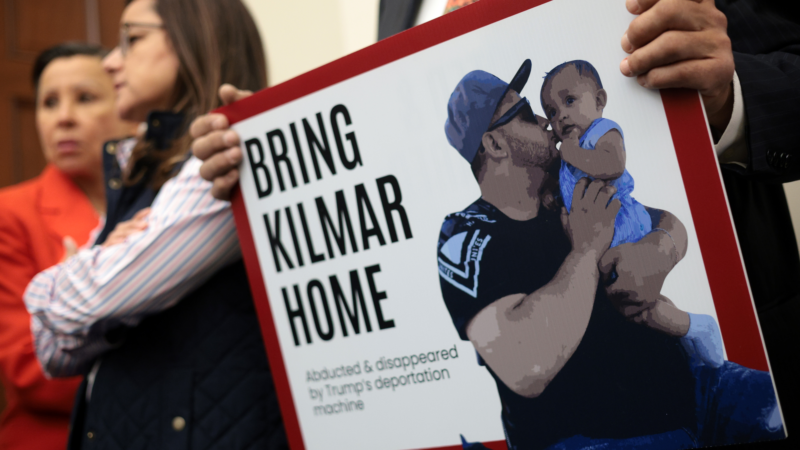Maryland judge again asks government to return man wrongly deported to El Salvador
GREENBELT, Md. — A federal judge in Maryland wants the federal government to do all it can to “facilitate” the return of a Maryland man mistakenly deported to El Salvador.
Just hours after the Supreme Court largely upheld her original order to bring Kilmar Abrego Gracia back to the U.S., federal judge Paula Xinis issued a new one, directing the federal government to “take all available steps to facilitate the return” of Abrego Garcia to the United States as soon as possible. And she ordered the Justice Department to provide an immediate update on his location and status, what steps the government has taken so far to bring him back and what additional steps it is considering.
In response, the Trump administration is asking for more time to answer the judge’s questions. In one court filing on Friday, lawyers for the Justice Department argued the government needs “a meaningful opportunity to review the Supreme Court’s decision before it is ordered to report what steps it will take in response to that decision.”
“Foreign affairs cannot operate on judicial timelines, in part because it involves sensitive country-specific considerations wholly inappropriate for judicial review,” the lawyers wrote in another filing.
Judge Xinis had rejected the Justice Department’s request to delay a status conference that was set for Friday afternoon.
Abrego Garcia’s case has become a high-stakes clash between the White House and courts, and the latest case to test how quickly the Trump administration can remove people it says are threats to Americans’ safety. His case is unique in that the administration admitted his deportation was a mistake, but says he cannot be brought back.
The Supreme Court on Thursday directed the Trump administration to “facilitate” Abrego Garcia’s release from custody in El Salvador, and to “be prepared to share what it can concerning the steps it has taken and the prospect of further steps.” The unsigned order marked a rare win for those challenging the administration’s deportation orders.
There were no dissents, though Justice Sonia Sotomayor in a statement accompanying the order wrote that “to this day, the Government has cited no basis in law for Abrego Garcia’s warrantless arrest, his removal to El Salvador, or his confinement in a Salvadoran prison. “Nor could it.” The court’s two other liberal justices joined her.
The Supreme Court sent the case back to Xinis with instructions to clarify the wording of her original order — in particular, her use of the word “effectuated” in her directions to the Trump administration.
Xinis’s order — now relying only on the word “facilitate” — seems intended to address the Supreme Court’s question.
The justices also wrote that the intended scope of that term is “unclear,” and that it might exceed the lower court’s authority. They instructed the lower court to “clarify its directive, with due regard for the deference owed to the Executive Branch in the conduct of foreign affairs.”
The Department of Homeland Security emphasized that section of the order in its response.
“SCOTUS agreed with us that the District Court improperly interfered with the President’s foreign affairs power,” said Tricia McLaughlin, assistant secretary for public affairs, in an emailed statement. “The District Court was overbearing and, as SCOTUS said, should clarify its directive with due regard for the deference owed to the Executive Branch in the conduct of foreign affairs. We look forward to continuing to advance our position in this case.”
Dispute over whether to bring him back
The Trump administration has admitted that Abrego Garcia was deported because of what it calls an “administrative error,” but has argued that there is nothing it can do because Abrego Garcia was already out of the U.S. in the custody of the Salvadoran government when the mistake was discovered.
Xinis, the Maryland judge, had earlier rejected that argument.
Abrego Garcia had been living in Maryland for over a decade, along with his wife and their three children, all U.S. citizens. In 2019, an immigration judge had granted him a form of protected status that should have prevented his deportation to El Salvador.
Despite that, ICE officers arrested Abrego Garcia last month. He was deported to El Salvador a few days later, along with hundreds of other men that the Trump administration accuses of being gang members.
The White House maintains that Abrego Garcia is a member of the Salvadoran gang, MS-13, which the Trump administration has designated as a Foreign Terrorist Organization, and should not be allowed back into the U.S.
But Abrego Garcia’s lawyers dispute that. They say he has been living peacefully in Maryland for 14 years, and has never been charged with or convicted of a crime in any country. Abrego Garcia’s lawyers argue the MS-13 allegations are based largely on an accusation from a confidential informant who accused him of being a member of the gang in New York, where Abrego Garcia has never lived.
Xinis described the accusations as “vague” and “uncorroborated,” and noted that the Trump administration has introduced no evidence of a criminal indictment or complaint into the record.
More appeals in the case are likely.
Still, the Trump administration appeared unwilling to back down. In a social media post on Thursday night, White House deputy chief of staff Stephen Miller framed the Supreme Court’s order as a rejection of the lower court’s reasoning.
The justices “made clear that a district court judge cannot exercise Article II foreign affairs powers,” Miller wrote. He argued that El Salvador is holding “the illegal alien terrorist” in custody, not the U.S. government — leaving it unclear exactly when, or if, Abrego Garcia would be returning to Maryland.
30 years ago, ‘Waiting to Exhale’ was the blockbuster Hollywood didn’t anticipate
The 1995 adaptation of Terry McMillan's novel celebrated the beauty of Black sisterhood.
Timothée Chalamet, a Neil Diamond tribute band and more in theaters for Christmas
Also in theaters this week, Jack Black and Paul Rudd star in a meta reimagining of Anaconda, Amanda Seyfried in a Shaker origin story, and Ralph Fiennes plays a World War I-era choirmaster.
When porch pirates steal medicine instead of holiday gifts
Mail theft can happen around the holidays, but sometimes, instead of getting a new iPad, the thief swipes a mail order medicine. Here's what to do about it.
In the snow, these salamanders get supercool
Blue spotted salamanders have been seen walking across snow and new research suggests how they get by in the cold.
U.S. and Ukraine reach consensus on key issues aimed at ending the war
The United States and Ukraine have reached a consensus on several critical issues, but sensitive issues around territorial control in Ukraine's eastern industrial heartland remain unresolved.
Despite Vatican-Israel tensions, Catholics and Jews work to build trust in Haifa
Religious leaders started getting together after Oct. 7, 2023, in the hope of preventing a repeat of Arab-Jewish violence that erupted after a previous conflict in Gaza two years earlier.









